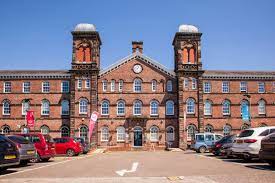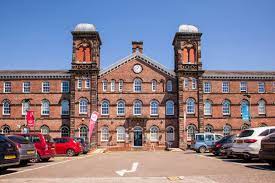
University of Cumbria: Rankings, Courses & Admissions
Carlisle, UK
Overview
University of Cumbria's Fees
Scholarship
University of Cumbria's Admission
University of Cumbria's Ranking
Popular CoursesView All
About University
Fusehill St, Carlisle CA1 2HH, United Kingdom
Founded in 2007
upGrad’s Accelerated Pathway Program
Low Cost
Enroll and save up to INR 60 lakh on study abroad courses
Post Study Work Visa
Eligible for up to 24 months of PSWP/36 months of OPT visa across countries like the USA, UK, Germany, Canada and more
Get 4x ROI
Explore attractive career opportunities & better ROI across robust global economies
Explore Accelerated Pathway Programs
Popular Universities in UK
- Imperial College London
- University of Oxford
- University of Cambridge
- University College London
- The University of Edinburgh
- University of Manchester
- Kings College London
- University of Bristol
- The University of Warwick
- University of Leeds
- Coventry University
- University of Leicester
- Birmingham City University
- Sheffield Hallam University
- University of Portsmouth
- Queen Mary University of London
- University of West London
- De Montfort University
- Northumbria University
- University of Exeter
Top Specialization in UK
MASTERS
- MS in Public Health in UK
- MS in Computer Science in UK
- MS in Data Science in UK
- MS in International Business in UK
- MS in Business Analytics in UK
- MS in Cyber Security in UK
- MS in Accounting and Finance in UK
- MS in Human Resource Management in UK
- MS in Biomedical Engineering in UK
- MS in Mechanical Engineering in UK
- MS in Civil Engineering in UK
- MS in Artificial Intelligence in UK
- MS in Data Analytics in UK
- MS in Digital Marketing in UK
- MS in Biotechnology in UK
BACHELORS
- Bachelors in Computer Science in UK
- Bachelors in Nursing in UK
- Bachelors in Hospitality Management in UK
- Bachelors in Hotel Management in UK
- Bachelors in Mechanical Engineering in UK
- Bachelors in Psychology in UK
- Bachelors in Sports Management in UK
- Bachelors in Neurology in UK
- Bachelors in Obstetrics/Gynecology in UK
- Bachelors in Occupational Medicine in UK
- Bachelors in Ophthalmology in UK
- Bachelors in Orthopaedic Surgery in UK
- Bachelors in Otolaryngology in UK
- Bachelors in Paramedic in UK
- Bachelors in Pediatrics in UK
Frequently Asked Questions
Is there any age limit for applying to undergraduate or postgraduate courses at the University of Cumbria?
There is no formal upper age limit for applicants. Undergraduate applicants must have completed the Higher Secondary School Certificate (Year 12) with a minimum of 45% or a GPA of 2.8. Postgraduate entry requirements vary by course.
What are the common admission interview questions for international applicants at the University of Cumbria?
Interview questions often assess motivation, understanding of the course, and suitability for study in the UK. Applicants must have a 2:1 in relevant subjects, and tests such as GAMSAT or UCAT are used to rank candidates.
Can students at the University of Cumbria transfer credits from previous institutions?
Yes, the University of Cumbria allows credit transfers through its Accreditation of Prior Learning (APL) process. Prior certification or experiential learning must match the course's content and level. Transfers are usually accepted into year 2 or 3, based on relevance and availability.
What kind of academic flexibility does the University of Cumbria offer for working professionals?
The university offers work-based learning programs like the Continued Professional Development course (CPD). This allows professionals to study through distance learning and flexible schedules. Flexible contract lengths of 40-46 weeks accommodate diverse professional commitments.
Are there any part-time job opportunities available on or near campus for international students?
International students in Cumbria can work up to 20 hours per week during term time, as per UK visa rules. On-campus roles and local part-time jobs are available, helping students manage living costs, which average around £12,000 (INR 13.5L) per year.
How accessible are mental health and wellbeing resources for enrolled students?
The university offers counselling, peer mentoring, and chaplaincy support, with usage growing 15% annually. Aligned with UK-wide mental health goals, these services have helped 80% of users report improved wellbeing.
What type of accommodation is available for students with families or dependents?
Family housing is limited but arranged via university partners and local listings. Leases typically span 40 to 46 weeks, with priority for health and education students. Average monthly rent in Carlisle for family units is around £650 (INR 73K), reflecting local affordability constraints.
Does the university provide guidance or assistance for students interested in launching startups or entrepreneurial ventures?
Yes, the university offers resources such as startup advice, funding opportunities, and marketing support through its ‘Alumni Business Start-Up’ program. These services aim to assist students in developing their business ideas.
Does the University of Cumbria accept Indian Class 12 or IB scores for UG admissions?
Yes, the university accepts Indian Class 12 scores with a minimum of 60% or GPA 2.8 for undergraduate admissions. IB diploma holders are also eligible, with specific score requirements varying by course.
What role do student representatives or unions play in shaping university policies or student life?
The University of Cumbria Students' Union (UCSU) elects three full-time officers annually to represent students. They work to support students, provide advice, and enhance the overall student experience.
Are there short-term certificate or diploma courses available for skill development at the University of Cumbria?
The university offers over 50 short courses and professional qualifications in areas such as project management, leadership, and education. These courses range from one to two days in duration.
Disclaimer
All information provided on this page is for general use and upGrad Abroad is not responsible for any errors or omissions. The Universities involved in this Program are accredited/recognized in the countries where they are established. Relevant terms and conditions apply.Any action taken upon the information found on this website is strictly at your own risk.











